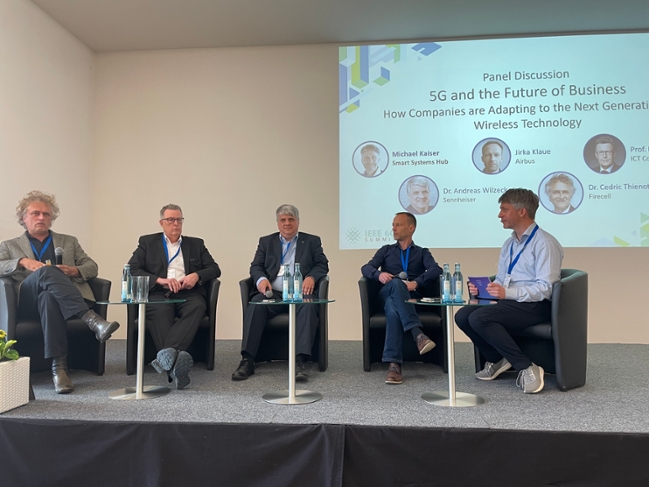Pure networking: broad exchange on 5G campus networks at the IEEE 6G Summit.
5G campus networks are an important future market with a wide range of potential applications for industry, business and public institutions. The IEEE 6G Summit brought together leaders in the field of mobile communications to discuss the latest developments and project results.

From May 9 to 11, 5G/6G experts met in Dresden, Germany, to exchange ideas about the future and possible applications of the latest communication technologies at the IEEE 6G Summit.
A central building block for 5G solutions in the economy are non-public 5G networks, so-called campus networks. Through both the national technology program "5G Campus Networks" and the Franco-German cooperation program "Franco-German Ecosystem for Private 5G Networks," the German Federal Ministry of Economics and Climate Action (BMWK) is funding research and experimentation with such solutions.
Ecosystem for 5G campus networks: latest developments from 5G-OPERA and CampusOS
At the 6G Summit, project activities and initial results were presented during a well-attended kick-off workshop. As host and leader of the 5G-OPERA project, Prof. Frank Fitzek from TU Dresden, together with Florian Kaltenberger from the French research institute Eurecom, showed which 5G systems can be realized with European open source components and which opportunities lie in this development. In addition, the German national lead project CampusOS aims to build an ecosystem for 5G campus networks. To this end, the project team is testing the radio technologies in various industrial application scenarios. The two projects are working closely together and used the Summit for a broad technical exchange on the progress of their project work.
Creating added value through cross-border cooperation
Also in attendance were the somewhat smaller Franco-German demonstration projects MERCI and stic5G, each of which is testing 5G campus networks in different domains. The partners are already benefiting from the Franco-German exchange, as some components essential to the overall systems are manufactured and distributed in either France or Germany. Together, the partners in the 5G-OPERA project are designing cost-effective end-to-end solutions that are based on open-source technologies and are especially suitable for setting up small private networks. Another important aspect of these projects is the scientific exchange across national borders.
After the first joint activities of CampusOS and 5G-OPERA at the Hannover Messe, the scientific exchange was deepened on May 11 in the follow-up to the 6G Summit at the Dresden Messe. In addition to technical issues, a focus was laid upon economic aspects and, in particular, the costs of 5G campus networks.
More information
- Recommend this page:
- Print view